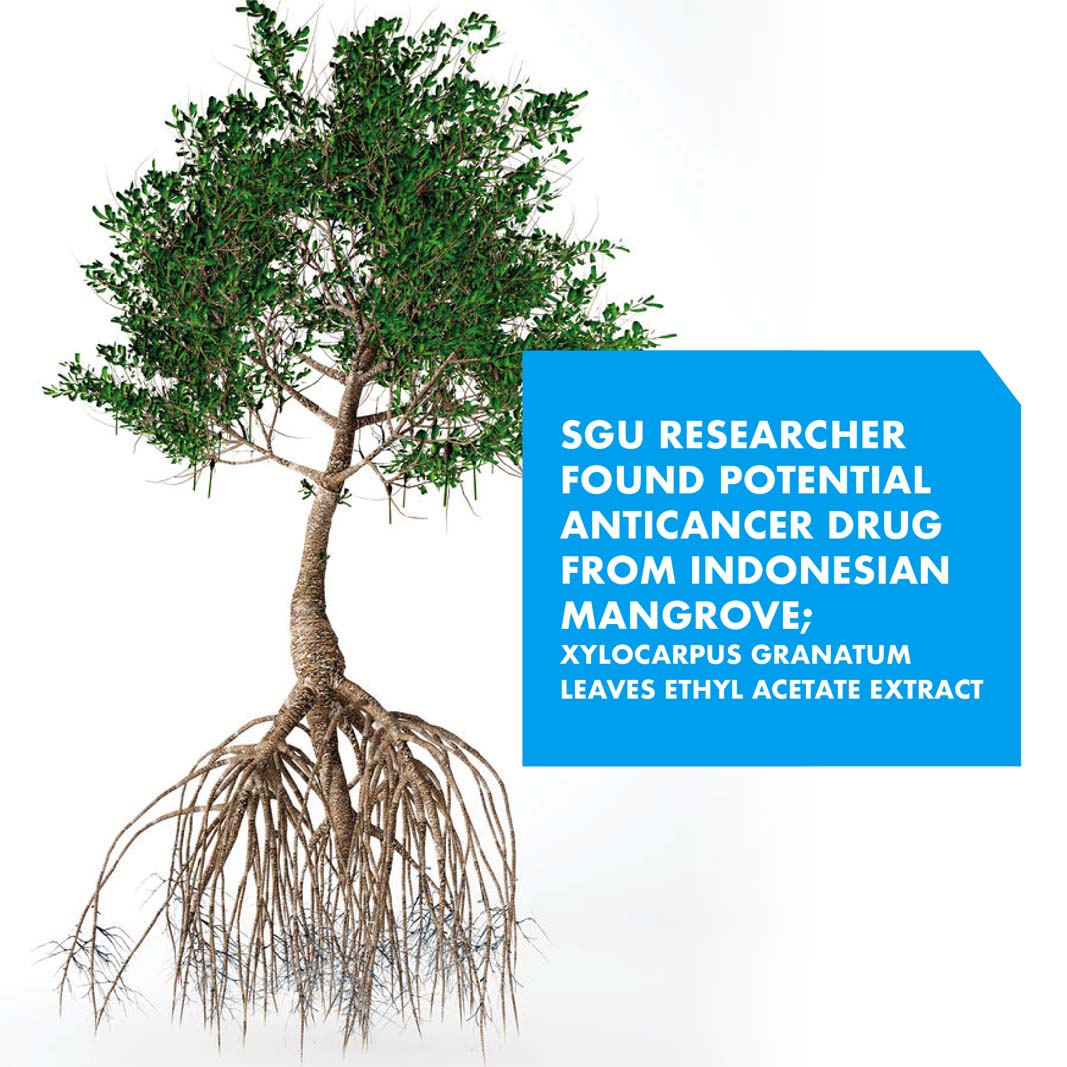
Made By SGU: SGU Researcher Found Potential Anticancer Drug From Indonesian
Mangrove; Xylocarpus Granatum Leaves Ethyl Acetate Extract
Mangroves are salt-tolerant plants that grow on brackish coasts and seawater systems. Considered to be a cornerstone species, mangroves produce secondary metabolites which helped them thrive on both freshwater and marine systems, as well as provide a habitat for many living beings. In Indonesia, mangroves are a very common sight, as the country hosts the largest area proportion for the mangrove forest ecosystem and 28.5% of the global mangrove population. As mangrove trees are considered to be crucial both culturally and environmentally for many coastal regions; with some locals even utilizing the plants as a staple food, for carpentry, and traditional medicine. By conserving and performing reforestation on their ecosystem throughout Indonesia if not globally, species biodiversity on the surrounding mangrove ecosystems would thrive and local’s benefited from the existence of the mangrove forest.
In terms of bioprospecting, mangrove forest conservations would open opportunities in various industrial sectors such as pharmaceutics, cosmetics, and materials. From the conservations, naturally-procured materials such as barks and root can be taken for carpentry, agriculture, and foodstuff; while phytochemicals found in the plants could be analyzed and synthesized in labs for cosmetics and medicinal usage. This would also elevate economic growth for regions containing these mangrove forests if not nationally.
Head of Academic Research and Community Service & Lecturer of Biomedical Engineering from Department of Chemical Engineering, Kholis Abdurachim Audah from Faculty of Life and Science have done research project regarding to the Indonesian mangrove Xylocarpus granatum leaves ethyl acetate extract as potential anticancer drug. This project has been financially supported by Swiss German University. This research has been published in Scientific Reports.
Studies have shown that several local mangrove species exhibited antimicrobial activities, as well as containing large traces of bioactive phytochemical compounds. A mangrove species called Xylocarpus granatum is commonly found throughout South Asia, Northwest Australia, Oceanic islands, and East Africa10; with the plant being reported to exhibit cytotoxicity against several carcinoma cells as well as antioxidant activity from its phytochemical content. Despite being widespread, studies have found that phytochemicals found in mangroves especially X. granatum are different for each geographical site and that the metabolites produced are heavily infuenced by their surrounding environment. This study was done to examine the contents of Indonesian X. granatum species which were understudied phytochemically, with the leaves selected for extraction as there were meager studies conducted globally for X. granatum leaves extracts when compared to barks, seeds, and fruits as well as to ease extraction process. This study was also done to give some preview on the difference in phytochemical composition and biological activity of X. Granatum living in different environments and geographical backgrounds.
Local Xylocarpus granatum leaves were extracted by ethyl acetate solvent and characterized by TLC fingerprinting and 2D 1H NMR spectroscopy to contain phenolic compounds as well as several organic and amino acids as metabolic byproducts, such as succinic acid and acetic acid. Traces of flavonoids and other non-categorized phenolic compounds exhibited intermediate antioxidant activity (antioxidant IC5084.93 ppm) as well as anticancer activity against HeLa, T47D, and HT-29 celllines; which the latter being most effective against HT-29 with Fraction 5 contained the strongest activity (anticancer IC5023.12 ppm). Extracts also behaved as a natural growth factor and nonlethal towards brine shrimps as well as human adipose-derived stem cell hADSC due to antioxidative properties. A stability test was performed to examine how storage conditions factored in bioactivity and phytochemical structure. Extracts were compared with several studies about X. granatum leaves extracts to evaluate how ethnogeography and ecosystem factored on biologically active compounds.
About SGU
SWISS GERMAN UNIVERSITY (SGU) is an international university in Indonesia, was established in 2000 as a joint effort between Indonesia, Germany, Switzerland, and Austria. We are the pioneer in offering international curricula in Indonesia. Qualified students can graduate with a Double Degree from Indonesia and Germany, which SGU provides in cooperation with partner universities; surely a valuable tool for your future careers. Ever since its establishment, SGU has been dedicated to delivering quality education in line with international standards and aims to develop skilled professionals who meet the demands of the industry. In order to achieve its objectives, SGU offers quality-oriented learning through 12 Bachelor’s Degree Programs and 4 Master’s Degree Programs ranging from Engineering, Information Technology, and Business to Life Sciences and Social Sciences. Furthermore, with small class sizes, and with English as the medium of instruction, you can look forward to pursuing your tertiary education and degree with full confidence.
Curriculum Back
